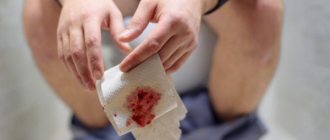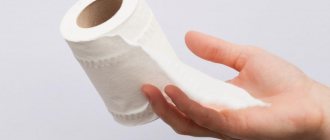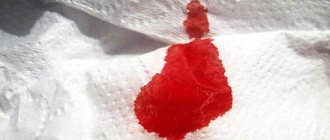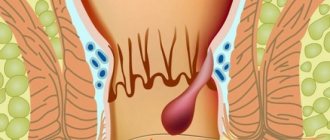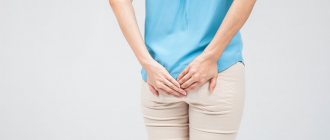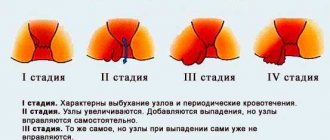Why do hemorrhoids bleed?
The occurrence of bleeding of hemorrhoids is just one of the symptoms of the disease at a certain stage of the disease. If the patient often complains of itching, pain and prolapse of nodular formations, then bleeding may not be a concern. Blood is more often observed after defecation. It is scarlet in color and can flow in a trickle or simply drip after passing stool. Hemorrhoids with blood occur for the following reasons:
- Diarrhea.
- Chronic constipation. These are the main reasons for bleeding in this disease. Solid feces, moving along the rectum and touching the hemorrhoids, can injure them.
- Childbirth. They often cause cracks in the rectum and the release of blood clots during hemorrhoids in women.
What is the danger of bleeding from hemorrhoids?
Hemorrhoidal bleeding occurs when the disease is already advanced against the background of hyperplastic changes in the veins of the rectum. Therefore, even a single case requires examination by a proctologist.
If the necessary measures are not taken, complications may develop:
- Iron-deficiency anemia. With large blood losses, iron deficiency occurs and anemia develops, leading to tissue hypoxia.
- Infections. Infection occurs faster through a damaged vessel.
- Exacerbation of chronic diseases of the pelvic organs.
If blood is detected from the anus, you should consult a specialist as soon as possible. Self-medication can also cause complications.
Symptoms of the disease
The first symptoms should alert a person; they are associated with unusual sensations in the rectal area; there may be a feeling of heaviness that does not go away even after going to the toilet. Itching, burning occurs in the anus, and sometimes caustic mucus is released. The progression of the disease is gradually observed: sharp pain appears during the process of defecation, increased body temperature, and then nodes form.
Signs of internal hemorrhoids
The main symptom is the appearance of hemorrhoids, which are located inside the anus under the rectal mucosa. As a rule, they are painless. At the initial stage of the appearance of internal nodes, slight bleeding may be observed after defecation. The more advanced the pathology, the larger the nodes and the more pronounced the inflammatory process of the intestinal walls and anal area. This can cause bleeding and even anemia. The main symptoms of internal hemorrhoids are:
- rectal bleeding;
- pain during bowel movements;
- feeling of incomplete emptying;
- loss of nodes;
- inflammation of hemorrhoidal cones;
- anal fissures;
- itching in the anus.
Characteristic symptoms of external hemorrhoids
The first unpleasant symptoms of the external form of the disease bother a person even before the expansion of the venous plexuses. The onset of the disease makes itself felt by irritation and itching in the anal area, pain during bowel movements during exacerbations, slight bloody discharge due to the presence of cracks and damage to the mucous membrane during bowel movements. There may be slight swelling of the anus and the presence of bumps of different sizes around it.
When hemorrhoids become inflamed, blood appears during bowel movements, effective treatment methods
The digestive system of every person is a long tube with a complex structure.
It connects the esophagus to the anus. The thickness of such a tube may vary in different areas - it either expands or contracts. If the digestive tract is damaged in any area, blood may appear in the stool. Medicine has established the main causes of such phenomena.
Every person should know how dangerous blood is in hemorrhoids, and also why bleeding is a reason to immediately visit a doctor.
Blood
Causes of hemorrhoidal bleeding
Doctors establish the following causes of bleeding from the intestine due to hemorrhoids:
- The presence of inflamed hemorrhoids. They do not always become inflamed, but only during exacerbation of hemorrhoids. This provokes an increase in their size, because the inflammatory process is manifested by swelling of the tissues and narrowing of the intestinal lumen. In this case, passing feces severely injure the vessels, and through wounds are formed that bleed. They do not have time to fully heal before the next bowel movement, repeated opening and bleeding occurs;
- Constipation is another cause of bleeding from hemorrhoids. Continuous strong efforts when trying to go to the toilet provoke blood flow to the pelvic vessels. This increase in pressure causes ruptures of the vascular wall. Also, with constipation, feces become hard and dense, and if there are hemorrhoids on the intestinal walls, it injures them. This also leads to injuries to the mucous membrane and blood;
- Anal fissures. They often cause bleeding during bowel movements, even at rest. The tension of the sphincter and the tension of the fibers next to it causes stretching of the existing crack and the formation of blood discharge in the feces.
- Constant and prolonged sitting, for example, during sedentary work, provokes the development of hemorrhoids and inflammation of existing nodes. This correlates with a large load on the abdominal muscles, intestinal vessels and sphincter in a sitting position;
- Congenital tendency to develop hemorrhoids. It is manifested by weakness of the connective tissue and vessels of the anal canal.
One of the causes of bleeding
Characteristic symptoms
In the early stages of hemorrhoids, the formation of bleeding nodes is indicated by the presence of scarlet-colored blood in the stool. It can be visible on linen and toilet paper.
If hemorrhoids are in advanced form, heavy bleeding occurs. A person may need to be hospitalized, so at the first suspicious pathological signs it is recommended to go to a proctologist.
If blood is visible in the stool during defecation, it is necessary to clarify the nature of the discharge and its quantity:
- Light bleeding - occurs only with constipation, due to a disrupted diet and eating habits;
- Heavy bleeding - when during defecation blood is released in a pulsating stream. It is scarlet in color. Most likely, bleeding develops due to injury to the mucous membrane of hemorrhoids, erosions, and cracks in the rectum.
Symptoms
Bleeding hemorrhoids have some developmental features:
- The discharge can be dripping, splashing, it is scarlet, never dark red, without clots or streaks. The doctor must take into account what the discharge looks like;
- Bleeding is not accompanied by pain, except in situations where hemorrhoids are complicated by the formation of cracks. The disease tends to have a hidden course;
- In advanced stages, the development of bleeding is sudden and sudden; it occurs not only during bowel movements;
- If there are complications, in situations where hemorrhoids prolapse, loss of large amounts of blood may develop, threatening human health.
With uncomplicated hemorrhoids, the amount of bleeding is small, the pathological process does not pose a threat to human health and life. But with regular occurrence and lack of suitable treatment, the risk of anemia and a decrease in the content of red blood cells and hemoglobin in the blood increases. It is forbidden to delay treatment of hemorrhoids from a doctor.
Bleeding can occur without defecation and is not associated with an increased load on the vessels during stages 3 or 4 of hemorrhoids. This occurs due to severe thinning of the walls of hemorrhoids and an increase in their vulnerability. In this case, the bleeding is profuse, and the person needs urgent hospitalization and medical attention.
Methods to stop bleeding for internal and external hemorrhoids
- In case of hemorrhoids, in order to stop bleeding, you must immediately wash yourself with cool water and apply a cool compress, especially when the bleeding is from an external node. To do this, use ice, which is wrapped in gauze or thin cloth.
- When the hemorrhoid lump is inside the rectum, placing ice suppositories will be effective. They are easy to make yourself: roll cones out of cardboard, pour water into them and freeze them in the refrigerator. This first aid must be prepared in advance so that it is always at hand.
You cannot place chilled candles for more than 5-7 seconds. Hypothermia provokes complications in the functioning of the genitourinary system and digestive organs.
As you get used to it, the shelf life of the suppositories increases.
- You can stop the bleeding with the help of drugs - “Vikasol”, “Etamzilat”, “Dicynon”. They are available in tablets and liquids for injection. This method is one-time in nature; the possibility of long-term treatment for hemorrhoids must be discussed with a doctor.
Vikasol
- Use of a hemostatic sponge. You can easily buy it at any pharmacy. It has a soft porous structure, thickness 9 mm, the material is collagen fibers, which are impregnated with drugs.
If the hemorrhoids are localized on the outside, then the sponge is applied to the node for 2-3 minutes. In case of internal pathology, it is carefully rolled up and inserted into the anus. There is no need to pull it out, as the sponge dissolves spontaneously.
- Use of suppositories. Their peculiarity is that they retain their appearance even at room temperature. Only after entering the rectum does the suppository melt and immediately enter the bloodstream. Suppositories quickly stop severe bleeding. The most effective include:
- Suppositories with propolis. Propolis has a positive effect on blood clotting, stopping it. Suppositories can be found at any pharmacy. 1 piece is enough to stop bleeding from hemorrhoids;
Suppositories with propolis
- Suppositories with phenylephrine. The substance helps to quickly normalize blood clotting. In this case, even the most severe bleeding stops after a short time. But the drug has a contraindication due to its ability to increase blood pressure - hypertension;
- Methyluracil suppositories. They not only stop bleeding, but promote the healing of wounds with cracks.
Treatment of hemorrhoidal bleeding (drugs and their brief characteristics)
If bleeding from hemorrhoids occurs after defecation, treatment involves diagnostics and the correct selection of a drug to stop bleeding from the rectum. As a rule, these are medications in tablets. The following are considered the most popular and effective:
This drug can be used to stop bleeding from hemorrhoids not only for an adult, but also for a child.
The drug is prohibited for use by people with a high degree of blood clotting and thromboembolism. Women during pregnancy are allowed to use the drug only as directed by a gynecologist.
An effective hemostatic drug. It does not have a vasoconstrictor effect, therefore it prevents the formation of blood clots in hemorrhoids. The medication can provoke some side effects on the body:
- headache;
- nausea;
- dizziness.
The medicine is contraindicated for people with thromboembolism, leukemia and during lactation.
"Dicynon"
The drug helps normalize the tone in the blood vessels and relieves swelling in the anal area. The medicine has no side effects. If we talk about contraindications, the drug is not recommended only for people with hypersensitivity to its composition.
The drug stops the inflammatory process in hemorrhoids and strengthens the vascular walls of the rectum. The medication is effective for stopping hemorrhoidal bleeding at any stage of hemorrhoids. It restores normal blood circulation and improves local immunity.
How to stop bleeding from hemorrhoids
Heavy discharge stops immediately after the completion of the act of defecation; for this reason, a person does not consider it necessary to take measures. However, if hemorrhoids bleed, immediate action should be taken. It is dangerous to neglect the disease, anemia develops, acute paraproctitis may appear, then surgical treatment (surgery to remove nodes) is prescribed. There are different methods of treating the disease for complications and ways to quickly stop bleeding in hemorrhoids.
Ice compresses for external hemorrhoids
How to cure bleeding hemorrhoids at home? Cold perfectly constricts blood vessels and stops bleeding, which is why it is so often used in treatment. As a basis for compresses, you can use not just a tampon or pad soaked in cold water, but make a lotion from hydrogen peroxide. To do this, a cotton swab is generously moistened with a 3% peroxide solution and applied directly to the nodes for 15 minutes.
When hemorrhoids bleed, traditional medicine advises using compresses with infusions of various herbs. Plants such as knotweed (knotweed) are especially relevant in the treatment of illness. Fresh, clean knotweed leaves can be applied to hemorrhoidal cones. An infusion of wormwood will quickly stop bleeding and soothe pain. To do this, pour a spoonful of the herb into a glass of alcohol (vodka), leave it in the dark for a day and take it in the form of compresses or 15 drops orally for a week. Chamomile decoction will help get rid of inflammation in chronic diseases and relieve pain.
Ice suppositories for internal hemorrhoids
If hemorrhoids are bleeding heavily, you can quickly stop the bleeding with cold. To make ice candles, you need to make small cone-shaped molds out of paper or cardboard, fill them with water and place them in the freezer. Before use, the candle is dipped in warm water, removed from the paper and inserted into the rectum. The tip of the candle should be blunt so as not to injure the skin. Treatment can last up to two weeks, the first procedures should not exceed 20 seconds. Gradually, the time of holding the candle in the anus increases to one and a half minutes.
Enemas with medications or herbal infusions
It’s worth mentioning right away that they should be used only after consulting a doctor. This is a simple procedure that you can do at home yourself. To do this, the patient lies on his side with his legs pulled up to his stomach. With your left hand you need to spread your buttocks, and with your right hand, insert the tip of the syringe, pre-lubricated with Vaseline, into the anus and slowly press on it. After the enema, you need to lie in bed for 20 minutes.
To prepare an infusion for microenemas, you can take chamomile, which has a pronounced bactericidal effect: 2 tbsp. l. Pour boiling water over the plants and keep in a water bath for 20 minutes. Cool the broth, strain and add water to the original volume. For an enema you need 50 ml. You can reduce the size of nodes using microenemas from wormwood: 4 tbsp. l. Brew the herbs in a liter of boiling water and keep for 10 minutes over low heat. Cool the broth, leave for 5 hours, strain and use every day for a week.
Hemostatic sponges with furatsilin and boric acid
Sponges 6-9 mm thick can be used if hemorrhoids bleed heavily. The product should be applied to the sore spot for 1-2 minutes. By absorbing blood, the sponge begins to constrict the blood vessels and stops bleeding. In addition, it disinfects and heals the wound, and if the patient is diagnosed with internal nodes, it can be carefully inserted into the anus, where it will resolve itself.
Effective ointments for bleeding hemorrhoids
When treating hemorrhoids with bleeding, I also use ointments, gels and creams. The following are considered effective in this regard:
We also recommend reading: Neo Anuzol suppositories for hemorrhoids and reviews about them
- Fleming's ointment. It is a homeopathic remedy. Therefore, use does not depend on age criteria and other characteristics of the body. This remedy can be used even during pregnancy.
- Relief Advance. The ointment contains shark liver oil, which has a wound-healing effect and reduces the inflammatory process in the lesion. The ointment contains phenylephrine hydrochloride, which constricts the vessels of the rectum and eliminates bleeding in it.
- Hepatrombin. The active ingredient is heparin, which prevents blood from clotting quickly. Therefore, the ointment not only reduces bleeding, but also prevents the formation of blood clots. The medicine eliminates swelling and relieves inflammation of the walls of the rectum.
- Proctosan. The ointment contains bismuth, which treats maceration of the skin and relieves pain.
- Heparin ointment. Heparin contained in the product has hemostatic and anti-inflammatory properties.
- Troxevasin. The main properties of the gel are considered to reduce venous permeability, reduce inflammation and improve blood circulation. Proctologists recommend the simultaneous use of Troxevasin gel and tablets.
- Bezornil. Helps with various complications of hemorrhoids, including bleeding.
- Proctoglivenol. The ointment is used for external hemorrhoids. It has an anti-inflammatory, hemostatic, softening and analgesic effect on hemorrhoids and fissures. Also available in the form of rectal suppositories.
- Boro Derm. Herbal preparation. Its main action is aimed at relieving pain and discomfort in the rectal area. Eucalyptus extract has antiseptic properties, and horse chestnut perfectly strengthens blood vessels and stops bleeding.
- Aurobin. Thanks to the vitamins contained in the preparation, wounds and cracks heal faster.
- Berzonil. Use ointment to treat chronic hemorrhoids.
- Vishnevsky ointment. Helps with external manifestations of the disease. It is recommended to apply compresses with this remedy to the affected area.
These ointments are applied to damaged areas several times a day. In addition, compresses can be made using these products. Before doing this, it is recommended to wash the rectal area with baby soap.
Treatment of hemorrhoids with bleeding
An effective way to combat hemorrhoids is the use of rectal suppositories or ointments. A specialist will be able to choose the right hemostatic drugs for hemorrhoids after examining the patient. He will make a diagnosis and assess the extent of the disease. More often, suppositories or ointment Relief Advance are prescribed. The drug gives a lasting effect even in severe forms of the disease. In most cases, a week's therapy is sufficient. You can insert candles 4 times a day.
Gepatrombin G suppositories help stop bleeding and normalize the patient’s condition. They have proven their effectiveness in treating hemorrhoids with blood. After just a few uses, relief comes because the components of the drug stop inflammation, promote tissue regeneration, heal cracks, and promote rapid blood clotting. The pine and lemon oils included in the drug relieve burning, itching and pain. Suppositories should be administered 2 times a day after bowel movements.
Hemostatic drugs
An effective treatment for bleeding hemorrhoids is the use of a beekeeping product such as propolis. It has a good effect on blood clotting, so it is included in suppositories and is relevant in cases where hemorrhoids bleed heavily. Suppositories with propolis are recommended to be inserted into the anus every day before bed. The course of treatment is a week. Suppositories have the following properties:
- anti-inflammatory;
- wound healing;
- hepatoprotective.
If hemorrhoids bleed, tablet medications are prescribed, for example, the medicine Dicynon, Tranex or Etamzilat. They have the following properties:
- improving vascular permeability;
- activation of thromboplastin formation;
- improving blood clotting.
Fleming's ointment is often prescribed for illnesses accompanied by bloody discharge. It has the following effect:
- relieves inflammation;
- relieves pain;
- kills bacteria;
- dries;
- eliminates venous congestion.
- Biorevitalization - what is it, the cost of the procedure. Reviews about biorevitalization, before and after photos
- Nail lotion Klavio: instructions and reviews
- How to get rid of unwanted hair with hydrogen peroxide
Ointments for hemorrhoids with blood to reduce inflammation and heal nodes
If hemorrhoids bleed heavily, Vishnevsky ointment can be used in the form of compresses. It removes the symptoms of the disease: reduces inflammation, reduces pain, heals microcracks. The drug is also recommended for women during pregnancy. Heparin ointment is no less effective, preventing thrombosis and improving blood flow. The drug Proctosan will relieve pain especially quickly.
Tablets to strengthen the walls of blood vessels
Different degrees of disease development are treated with different types of tablets. The proctologist should prescribe medications after a general examination. Detralex tablets are considered one of the most effective phlebotropic drugs. They are relevant for acute or chronic forms of the disease and when hemorrhoids bleed heavily. In the first case, you need to take the drug according to the following scheme: 4 days, 3 tablets 2 times a day, and then 3 days, 2 tablets 2 times a day. In the second case, it is recommended to take 1 tablet 2 times a day with meals. The duration of therapy is calculated by the doctor. The drug provides:
- regulation of venous outflow;
- improves the condition of capillaries;
- protects and strengthens the walls of blood vessels;
- tones the veins.
If hemorrhoids bleed heavily, Troxevasin tablets may be prescribed. They are taken with meals, 1 tablet for up to 10 days, and provide:
- strengthening the walls of blood vessels;
- improvement of vein tone;
- powerful antioxidant effect on vascular cells.
Basics of drug treatment for bleeding hemorrhoids
The reason for delayed consultation of patients with bleeding hemorrhoids is often cited as fear of surgical treatment. But surgery is required only in severe cases. Typically, proctologists prescribe bed rest, a gentle diet and medications for local and general effects on the body.
External hemorrhoids usually bleed because they are located close to the anal sphincter.
The bleeding of their venous caverns is caused by:
- loss of tone and congestion of blood vessels;
- increased pressure inside hemorrhoids;
- thinning and tearing of the wall;
- penetration of red blood cells through leaky inflamed structures;
- injury from solid feces.
In conservative therapy, the requirements for hemostatic drugs for hemorrhoids include properties that counteract the mechanism of destruction:
- increased blood clotting;
- the ability to cause vasospasm;
- anti-inflammatory hormonal and antibacterial;
- for accelerated healing of mucosal defects - immunomodulatory.
Medicines should activate tissue regeneration.
Important! Among local agents, the most effective are ointments (gels, creams) and rectal suppositories. It is advisable to use combined medications that affect all parts of the disorders that contribute to bleeding. They are used after hygiene procedures with disinfectant solutions or herbal decoctions.
Treatment requires a course of oral tablets, and in severe cases, intramuscular and intravenous administration of drugs. For chronic hemorrhoids, it is important to use suppositories for preventive purposes.
How to treat bleeding hemorrhoids in traditional medicine
It is effective to insert potato suppositories, which are cut from raw root vegetables, into the anus at night. In case of inflammation, the affected area is lubricated with apricot oil. If internal hemorrhoids are bleeding, you can use steam baths with the addition of onions in milk. The remedy is prepared as follows: pour one and a half liters of milk into a clay pot, throw in 4 onions and simmer over low heat in a closed pot. Then sit over the steam.
Oak bark infusion
To prepare the product you will need 6 tbsp. l. bark, which is filled with 1500 ml of water. Place on the fire, bring to a boil, then keep for another 40 minutes in a steam bath. Let the product sit for two hours, strain, soak a cotton swab in it and apply to the nodes (you can make a sitz bath). Oak bark removes inflammation, swelling, pain, stops bleeding and strengthens the walls of blood vessels.
Decoction of sweet clover herb
The use of sweet clover decoction guarantees relief from pain; in addition, the plant has anti-inflammatory, anti-edematous, wound-healing and anti-varicose properties. To prepare the decoction, you need to pour 10 g of raw material into two glasses of boiling water and boil for half an hour. Then strain and take 3 times a day, 1 tbsp. l.
Steam baths with garlic
Among the traditional methods of treating severe bleeding, recipes with garlic are popular. The garlic composition removes inflammation, destroys infection, and reduces the size of hemorrhoidal cones. To achieve this result, you can make a steam bath. To do this you will need a metal bucket, a red brick, and a toilet lid. The brick is heated (not heated) in the oven, placed on the bottom of a bucket, and chopped garlic cloves on it. Place the toilet lid on the bucket and sit so that the steam hits the nodes. The body is wrapped in a blanket and sat for 20 minutes.
Candles with fir or sea buckthorn oil
Fir oil relieves pain and itching and works great for internal or external hemorrhoids. More often it is used to get rid of knots located outside. To do this, they need to be lubricated with oil as often as possible. If hemorrhoids bleed, sea buckthorn suppositories will help. They have anti-inflammatory, antibacterial, antitumor properties, restore damaged tissue, and promote blood clotting. The instructions recommend inserting one suppository into the anus at night for two weeks.
Reviews
Roman: I take the tablets as a painkiller. Candles help - they are easy to use. If you recommend drugs for the treatment of hemorrhoids with bleeding, Etamzilat suited me. Stopped the bleeding and helped relieve the inflammatory process.
Anastasia: The topic is delicate, but not uncommon. There are advertisements on TV for drugs used for hemorrhoids. I didn’t go to the hospital - I was embarrassed. I decided to treat myself. I visited websites, read recommendations and reviews. I decided to choose Proctosan. I was guided by TV advertising and people's reviews. I didn't regret it. The ointment worked immediately. A successful treatment for bleeding hemorrhoids. If earlier I tried to use traditional methods that helped for a couple of days, then after using Proctosan I forgot about the problem for a long time.
Valeria: I felt lumps in the anus and started looking for ways to solve the problem. It is necessary to get rid of hemorrhoids in the initial stage. I decided to start with traditional methods of treatment: decoctions, lotions. I realized that this is ineffective. It is necessary to stop the source of inflammation. They recommended Vishnevsky ointment - it’s cheap, but it helps. We applied compresses and saw positive results. The smell is disgusting, but if I choose smell or health, I’ll choose the latter. Inexpensive, high quality, quickly relieves problems in the anus.
Grigory: They haven’t come up with a better remedy for bleeding hemorrhoids than suppositories with the addition of sea buckthorn oil. Natural ingredients, rectal application, reasonable price, really help. I tried medications for bleeding hemorrhoids, tablets - little effect. After the pharmacist’s recommendation, I began using sea buckthorn suppositories.
Diet
A proper diet should contain sufficient amounts of fiber, which promotes the regular passage of stool. It is important to drink plenty of liquid every day, but it is better to avoid spicy, salty, fried foods altogether. You need to eat soups, cereals, salads, fruits, lean meats. Be sure to consume vegetable oils; they stimulate intestinal motility. When creating a weekly food menu, you need to consider:
- The best porridges are buckwheat, pearl barley, barley, oatmeal, and rolled oats.
- Prefer wholemeal bread.
- Avoid vegetables containing starch.
- Be sure to eat broccoli, cauliflower, carrots, cucumbers, zucchini, and beets.
- Eat more apples, apricots, prunes, bananas, dried apricots.
- Eat 60 g of bran every day; it will replenish the body's need for dietary fiber.
- For meat, boiled chicken fillet and turkey meat are suitable.
What to do if hemorrhoids cause bleeding after bowel movements
Hemorrhoids usually manifest themselves with specific symptoms: a burning sensation and itching in the anus; as hemorrhoids appear and fall out, acute pain occurs, intensifying during defecation, but passing after it.
Often the main symptom accompanying hemorrhoids is blood during bowel movements, which is found first on toilet paper, then on underwear, and as the bleeding intensifies, bright scarlet marks appear on the walls of the toilet.
And this is already a serious reason to consult a proctologist, if this has not been done before.
Causes of blood
Hemorrhoids occur if blood often stagnates in the pelvic vessels, in the hemorrhoidal plexus of veins around the anus. The disease is more likely to occur in people engaged in sedentary work and leading a sedentary lifestyle.
Hemorrhoids are also caused by:
- lifting weights;
- hereditary predisposition due to problems with the walls of blood vessels;
- prolonged constipation due to poor nutrition;
- pregnancy and childbirth.
Varicose veins of the hemorrhoidal plexus lead to a gradual disruption of blood flow in them and protrusion of the walls. Over time, such protrusions increase, transform, “twist”, turning into external and internal hemorrhoids.
During exacerbation or progression of hemorrhoids, the nodes swell and enlarge, closing the lumen of the rectum. When stool moves, especially a hard fecal lump during prolonged constipation, the walls of deformed vessels can be injured, and blood will appear in the stool.
Another reason for the appearance of blood during stool due to hemorrhoids is the rupture of the wall of a blood vessel during pushing and effort due to constipation. This is especially facilitated by hereditary weakness of the walls of blood vessels.
Frequent diarrhea can also cause rectal bleeding. After bowel movements, the blood stops, and there is practically no pain.
The cause of blood in the stool is anal fissures that bleed during stretching during bowel movements.
In further stages of hemorrhoids, when the disease is already in an advanced state, the patient can lose up to 70 ml of blood each time, rectal bleeding opens, regardless of effort and strain.
This occurs due to stretching and thinning of the walls of blood vessels, their increased vulnerability and permeability, which leads to the development of anemia, loss of red blood cells, a drop in hemoglobin, weakness, dizziness, and periodic fainting.
This condition is dangerous and requires hospitalization and serious treatment.
Difference from other diseases
Blood in the stool can appear not only with hemorrhoids, but also due to other intestinal pathologies. But there is an important difference: in the case of hemorrhoids, bloody discharge is not mixed with feces; it is usually scarlet in color and leaves marks on whatever the anus comes into contact with after defecation (paper, linen) or on the walls of the toilet.
Internal bleeding caused by rupture of large vessels in the abdominal cavity, due to traumatic injuries to internal organs of various kinds, makes the stool black. If it is detected, you should immediately consult a doctor.
Blood in the stool may appear due to:
- colon or rectal cancer;
- Crohn's disease;
- UC (nonspecific ulcerative colitis);
- infections of various kinds;
- polyps in the large intestine;
- proctitis;
- diverticulosis.
These diagnoses can be differentiated from hemorrhoids by distinguishing the type of blood impurities in the stool and based on the results of examination using: anoscope, sigmoidoscopy, digital examination, and various types of endoscopy (if necessary). Other symptoms of the disease may also differ.
With polyposis, little blood is usually released, it is thick and dark. With intestinal infections, bloody clots appear in diarrhea, at the same time chills appear, and body temperature rises. Crohn's disease and ulcerative colitis can also be accompanied by bleeding, but in the form of bloody diarrhea or blood clots in the stool.
